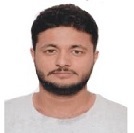CSIR - Centre for Cellular & Molecular Biology
Council of Scientific and Industrial Research
Ministry of Science & Technology, Govt. of India


Chief Scientist
Email: psijwali@ccmb.res.in
Phone: +91-040-27192944
Plasmodium, a protozoan that cause malaria, has a wonderfully complex development that involves over a dozen of different stages. Many of these stages develop in different cellular environments and contain stage-specific proteins and specialized organelles, which are produced and disposed as and when required. The parasite not only breaks down host cellular contents to obtain nutrients, it also enslaves many host proteins for its benefit. While limited understanding of the Plasmodium biology is a major hurdle to develop new vaccines and drugs, the presence of non-canonical cellular processes necessitates investigation of parasite-specific cellular processes. My lab is investigating “regulation of multiplication, genome fidelity and organelle function in the malaria parasite Plasmodium” with a goal to identify the candidates for development of vaccines and drugs
Selected Publications
Rizvi Z, Reddy GS, Gorde SM, Pundir P, Das D, Sijwali PS. Plasmodium falciparum contains functional SCF and CRL4 ubiquitin E3 ligases, and CRL4 is critical for cell division and membrane integrity. PLOS Pathogens 20(2): e1012045. https://doi.org/10.1371/journal.ppat.1012045.
Tanneru N , Nivya MA , Adhikari N, Saxena K, Rizvi R, Sudhakar R, Nagwani AK, Atul , Abdul Al-Nihmi FM, Kumar KA, Sijwali PS. Plasmodium DDI1 is a potential therapeutic target and important chromatin-associated protein. Int J Parasitol. 2023 Jan 16;S0020-7519(23)00013-9. doi: 10.1016/j.ijpara.2022.11.007.
Sudhakar R, Das D, Thanumalayan S, Gorde S, Sijwali PS. Plasmodium falciparum Atg18 localizes to the food vacuole via interaction with the multi-drug resistance protein 1 and phosphatidylinositol 3-phosphate. Biochem J. 2021 May 14;478(9):1705-1732. doi: 10.1042/BCJ20210001.
Navale R, Atul, Allanki AD and Sijwali PS. (2014) Characterization of the autophagy marker protein Atg8 reveals atypical features of autophagy in Plasmodium falciparum. PLoS One 9(11): e113220. doi:10.1371/journal.pone.0113220.
Singhal N, Atul, Mastan B, Arun Kumar K and Sijwali PS. (2014) Genetic ablation of plasmoDJ1, a multi-activity enzyme, attenuates parasite virulence and reduces oocyst production. Biochem. J. 461 (189–203). DOI: 10.1042/BJ20140051.
Education & Experience
| P.G: | Molecular Biology and Biotechnology ; Govind Ballabh Pant University of Agriculture & Technology, Pantnagar, India ; 1994 |
| Ph.D: | Cloning and characterization of the thrombospondin-related adhesive protein (TRAP) from the simian and the human malaria parasites ; International Centre for Genetic Engineering and Biotechnology-Jawaharlal Nehru University, New Delhi, India ; 1999 |
| Post.Doc: | Plasmodium proteases and hemoglobin degradation in erythrocytes ; UNIVERSITY OF CALIFORNIA SAN FRANCISCO, CA, USA ; 1999-2004 |
| Experience: | Assistant Researcher at UNIVERSITY OF CALIFORNIA SAN FRANCISCO, CA, USA from 2004-2008 |
|
data Found.... data Found.... data Found.... data Found.... data Found.... data Found.... data Found.... data Found.... data Found.... data Found.... data Found.... data Found.... | |
No data Found.... No data Found.... No data Found.... No data Found.... No data Found....No data Found.... No data Found.... No data Found.... No data Found.... No data Found....
| Title | Journal | Year |
|---|---|---|
| Development of diphenylmethylpiperazine hybrids of chloroquinoline and triazolopyrimidine using Petasis reaction as new cysteine proteases inhibitors for malaria therapeutics | European Journal of Medicinal Chemistry | 2023 |
| Bazedoxifene, a Postmenopausal Drug, Acts as an Antimalarial and Inhibits Hemozoin Formation | Microbiol Spectr | 2022 |
| Dissecting Plasmodium yoelii Pathobiology: Proteomic Approaches for Decoding Novel Translational and Post-Translational Modifications | ACS Omega | 2022 |
| Plasmodium falciparum Atg18 localizes to the food vacuole via interaction with the multi-drug resistance protein 1 and phosphatidylinositol 3-phosphate | Biochemical Journal | 2021 |
| Characterization of Plasmodium falciparum NEDD8 and identification of cullins as its substrates | Scientific Reports | 2020 |
| Identification of antimalarial leads with dual falcipain-2 and falcipain-3 inhibitory activity | Bioorg Med Chem Lett | 2020 |
| Synthesis and efficacy of pyrvinium-inspired analogs against tuberculosis and malaria pathogens | Bioorg Med Chem Lett | 2020 |
| Lyse-Reseal Erythrocytes for Transfection of Plasmodium falciparum | Scientific Reports | 2019 |
| Plasmodium falciparum GCN5 acetyltransferase follows a novel proteolytic processing pathway essential for its function | Journal of Cell Science | 2019 |
| Interaction with complement proteins and dendritic cells implicates LCCL domain-containing proteins (CCps) of malaria parasites in immunomodulation | Biochemical Journal | 2018 |
| Biotransformation of Artemisinin to 14-hydroxydeoxyartemisinin: C-14 hydroxylation by Aspergillus flavus. | Journal of Agricultural and Food Chemistry | 2018 |
| A conserved human DJ1-subfamily motif (DJSM) is critical for anti-oxidative and deglycase activities of Plasmodium falciparum DJ1. | Molecular & Biochemical Parasitology. 222:70-80. doi:10.1016/j.molbiopara.2018.05.003 | 2018 |
| Biotransformation of Artemisinin to 14-hydroxydeoxyartemisinin: C-14 hydroxylation by Aspergillus flavus. | Journal of Agricultural and Food Chemistry. DOI: 10.1021/acs.jafc.8b03573 | 2018 |
| Synthesis and evaluation of anti-plasmodial and cytotoxic activities of epoxyazadiradione derivatives. | Eur J Med Chem | 2017 |
| Synthesis and evaluation of anti-plasmodial and cytotoxic activities of epoxyazadiradione derivatives. | Eur J Med Chem. 134:242-257. doi: 10.1016/j.ejmech.2017.04.016. | 2017 |
| A Novel and conserved Plasmodium sporozoite membrane protein SPELD is required for maturation of exo-erythrocytic forms. | Sci Rep.7: 40407. doi: 10.1038/srep40407. | 2017 |
| Synthesis and evaluation of naphthyl bearing 1,2,3-triazole analogs as antiplasmodial agents, cytotoxicity and docking studies. | Bioorg Med Chem. 2017;25(1):221-232. doi: 10.1016/j.bmc.2016.10.029. | 2016 |
| Independent amino acid residues in the S2 pocket of falcipain-3 determine its specificity for P2 residues in substrates. | Mol Biochem Parasitol. 202(2):11-22. doi: 0.1016/j.molbiopara.2015.09.005. | 2015 |
| Emergence of pyrido quinoxalines as new family of antimalarial agents. | Eur J Med Chem. 77C:280-287. | 2014 |
| Genetic ablation of plasmoDJ1, a multi-activity enzyme, attenuates parasite virulence and reduces oocyst production. | Biochem. J. 461 (189-203). | 2014 |
| Characterization of the autophagy marker protein Atg8 reveals atypical features of autophagy in Plasmodium falciparum. | PLoS One 9(11): e113220. doi:10.1371/journal.pone.0113220. | 2014 |
| Synthesis and insight into the structure-activity relationships of chalcones as antimalarial agents. | J Med Chem. 2013 Jan 10;56(1):31-45. | 2013 |
| Blocking Plasmodium falciparum development via dual inhibition of hemoglobin degradation and the ubiquitin proteasome system by MG132. | PLoS One. 8(9):e73530. | 2013 |
| The Ionic and Hydrophobic Interactions Are Required for the Auto Activation of Cysteine Proteases of Plasmodium falciparum. | PLoS One. 7(10):e47227. | 2012 |
| Expression, Characterization, and Cellular Localization of Knowpains, Papain-Like Cysteine Proteases of the Plasmodium knowlesi Malaria Parasite. | PLoS One. 2012;7(12):e51619. | 2012 |
| Functional evaluation of Plasmodium export signals in Plasmodium berghei suggests multiple modes of protein export. | PLoS One 19;5(4): e10227. | 2010 |
| Antimalarial effects of human immunodeficiency virus type 1 protease inhibitors differ from those of the aspartic protease inhibitor pepstatin. | Antimicrob Agents Chemother 50(6): 2207-2209. | 2007 |
| Falcipain cysteine proteases require bipartite motifs for trafficking to the Plasmodium falciparum food vacuole. | Journal of Biological Chemistry 282(34):24961-9. | 2007 |
| A chimeric cysteine protease of Plasmodium berghei engineered to resemble the Plasmodium falciparum protease falcipain-2. | Protein Engineering, Design and Selection 20(4):171-177. | 2007 |
| Gene disruptions demonstrate independent roles for the four falcipain cysteine proteases of Plasmodium falciparum. | Mol Biochem Parasitol 150(1): 96:106. | 2006 |
| Structural basis for unique mechanisms of folding and hemoglobin binding by a malarial protease. | Proceedings of the National Academy of Sciences USA 103(31):11503-8. | 2006 |
| Plasmodium falciparum: Biochemical characterization of the cysteine protease falcipain-2'. | Exp Parasitol 112(3):187-192. | 2005 |
| The Plasmodium falciparum cysteine protease falcipain-2 captures its substrate, hemoglobin, via a unique motif. | Proceedings of the National Academy of Sciences USA102(26): 9138-9143. | 2005 |
| Plasmodium falciparum cysteine protease falcipain-1 is not essential in erythrocytic stage malaria parasites. | Proceedings of the National Academy of Sciences USA 101(23): 8721-8726. *Equal Contribution. | 2004 |
| Identification and biochemical characterization of vivapains, cysteine proteases of the malaria parasite Plasmodium vivax. | Biochemical Journal 378(2): 529-538. | 2004 |
| Gene disruption confirms a critical role for the cysteine protease falcipain-2 in hemoglobin hydrolysis by Plasmodium falciparum. | Proceedings of the National Academy of Sciences USA 101(13): 4384-4389. | 2004 |
| Independent intramolecular mediators of folding, activity, and inhibition for the Plasmodium falciparum cysteine protease falcipain-2. | Journal of Biological Chemistry 279(5): 3484-3491. | 2004 |
| Critical role of amino acid 23 in mediating activity and specificity of vinckepain-2, a papain-family cysteine protease of rodent malaria parasites. | Biochemical Journal 368(1): 273-281. | 2002 |
| Folding of the Plasmodium falciparum cysteine protease falcipain-2 is mediated by a chaperone-like peptide and not the prodomain. | Journal of Biological Chemistry 277(17): 14910-14915. | 2002 |
| Expression and characterization of the Plasmodium falciparum haemoglobinase falcipain-3. | Biochemical Journal 360(2): 481-489. | 2001 |
| Recombinant falcipain-2 cleaves erythrocyte membrane ankyrin and protein 4.1. | Molecular Biochemical Parasitology 116(1): 95-99. | 2001 |
| Systematic optimization of expression and refolding of the Plasmodium falciparum cysteine protease falcipain-2. | Protein Expression and Purification 22(1): 128-134. | 2001 |
| Systematic optimization of expression and refolding of the Plasmodium falciparum cysteine protease falcipain-2. | Protein Expression and Purification 22(1): 128-134. | 2001 |
| Characterization of native and recombinant falcipain-2, a principal trophozoite cysteine protease and essential hemoglobinase of Plasmodium falciparum. | Journal of Biological Chemistry 275(37): 29000-29010. *Equal Contribution. | 2000 |
| Cloning and sequence analysis of the thrombospondin-related adhesive protein (TRAP) gene of Plasmodium cynomolgi bastianelli. | Molecular Biochemical Parasitology 90(1): 371-376. | 1997 |
| Detection and quantitation of Helicoverpa armigera nuclear polyhedrosis virus by ELISA technique. | Indian Journal of Microbiology 36: 229-230. | 1996 |


2944
psijwali@ccmb.res.in

2945
g.srinivasreddy@ccmb.res.in

2945
gordesomesh@ccmb.res.in

2945
manash@ccmb.res.in

2945
pritamdas@ccmb.res.in

2945
kanikasaxena@ccmb.res.in

2945
anjana@ccmb.res.in

2945
amarttya@ccmb.res.in

2945
pragati@ccmb.res.in

2945
shivamachawale@ccmb.res.in

